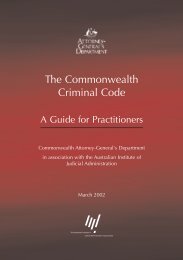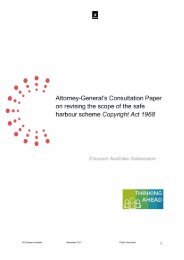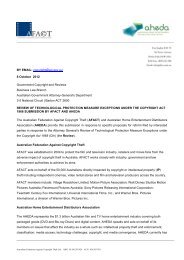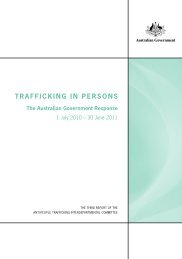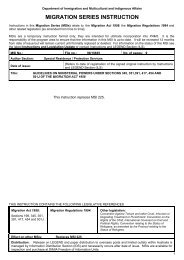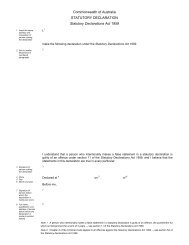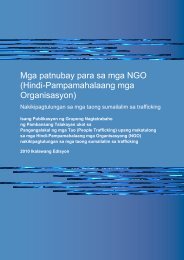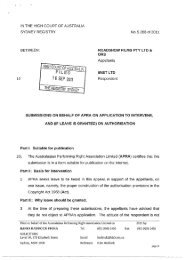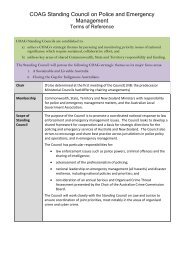Normann Witzleb [PDF 657KB] - Attorney-General's Department
Normann Witzleb [PDF 657KB] - Attorney-General's Department
Normann Witzleb [PDF 657KB] - Attorney-General's Department
Create successful ePaper yourself
Turn your PDF publications into a flip-book with our unique Google optimized e-Paper software.
serve some purpose within the contemplation of the relevant statute. 134 Against this<br />
background of developed jurisprudence, there are no concerns to grant remedial<br />
powers of similarly wide ambit to courts enforcing the proposed privacy action, like<br />
those envisaged by the NSWLRC and the ALRC.<br />
81 Strictly speaking, the NSWLRC and the ALRC proposals do not curtail a plaintiff’s<br />
remedial options, as both lists are intended merely to provide examples of orders and<br />
the court is free to make the most appropriate order. However, including them expressly<br />
in the legislation is likely to address any concerns a court might hold on whether it is<br />
legitimate to make the orders listed. For that reason, the ALRC proposal goes furthest in<br />
removing obstacles to the making of orders that are not currently available under<br />
general law.<br />
82 The ALRC proposes that aggravated damages should be available to plaintiffs. At<br />
common law, aggravated damages are awarded where the defendant’s conduct was<br />
outrageous and an increased award is therefore called for to compensate the injury to<br />
‘the plaintiff’s proper feelings of dignity and pride’. 135 The NSW Law Reform Commission<br />
does not see a need to avert to aggravated damages in the Draft Bill because it regards<br />
these as merely another form of damages for injury to feelings. 136 These variations<br />
reflect differences between the Commissions on whether the label of aggravated<br />
damages should be retained but do not affect the recoverability of increased<br />
compensation where the defendant’s manner of invading the plaintiff’s privacy has<br />
caused the plaintiff additional hurt. Quite appropriately, the plaintiff’s injury to feelings is<br />
compensable in the same way as comparable harm arising in other contexts, such as<br />
defamation or breach of confidence. The only substantial difference between both<br />
proposals is therefore that the NSW Draft Bill caps the amount of compensatory<br />
damages for non-economic loss at (an adjustable) $150,000. 137<br />
83 At common law, Australian courts allow exemplary awards more freely than their<br />
English counterparts. In particular, the restrictions on exemplary damages to the<br />
categories identified in the decision of the House of Lords in Rookes v Barnard 138 have<br />
not been accepted by the Australian High Court. 139 On the other hand, Australian law<br />
withholds punitive awards for breaches of equitable obligations. 140 This is particularly<br />
relevant in the context of privacy breaches, as the equitable doctrine of breach of<br />
134 In relation to s 80 of the Trade Practices Act 1974 (Cth), now s 232 of the Australian Consumer Law,<br />
see, for example, ACCC v 4WD Systems Pty Ltd (2003) 200 ALR 491; [2003] FCA 850 (Selway J); ICI<br />
Australia Operation Pty Ltd v Trade Practices Commission (1992) 38 FCR 248, at 268 (French J). In<br />
relation to s 1324 of the Corporations Act 2001 (Cth), see, for example, ASIC v Mauer-Swisse Securities<br />
Ltd (2002) 42 ACSR 605; [2002] NSWSC 741.<br />
135 Rookes v Barnard [1964] AC 1129, 1221 (Lord Devlin).<br />
136 The Law Commission for England and Wales recommended that they be amalgamated with damages<br />
for mental distress: Aggravated, Exemplary and Restitutionary Damages, Report No 247 (1997), at<br />
[2.42], Recommendations 1 and 2. See further N <strong>Witzleb</strong> and R Carroll, ‘The role of vindication in torts<br />
damages’ (2009) 17 Tort L Rev 16, at 23-26.<br />
137 The VLRC proposes that compensatory damages should not be capped: VLRC Report, at [7.219]. The<br />
ALRC does not address this issue.<br />
138 Rookes v Barnard [1964] AC 1129.<br />
139 Uren v John Fairfax & Sons Pty Ltd (1966) 117 CLR 118; [1966] HCA 40.<br />
140 Harris v Digital Pulse Pty Ltd (2003) 56 NSWLR 298; [2003] NSWCA 210.<br />
28


![Normann Witzleb [PDF 657KB] - Attorney-General's Department](https://img.yumpu.com/26247895/28/500x640/normann-witzleb-pdf-657kb-attorney-generals-department.jpg)

